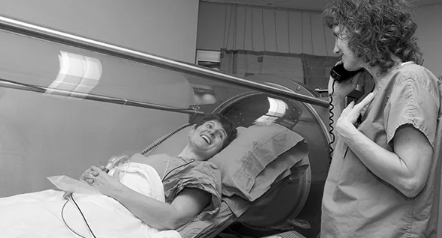Hyperbaric chambers may aid in treating Alzheimer’s disease; Students express thoughts on scientific discovery

Scientists continue to theorize whether hyperbaric treatment will be used as an alternative therapy for Alzheimer’s patients. 50 years ago scientists were introduced to the possibility of pure oxygen possibly reversing symptoms of memory loss.
April 13, 2022
“Exposure to high amounts of oxygen also has been shown to improve short-term memory in people who have had strokes and those with Alzheimer’s disease,” says Science News in an article posted in 1972. Science News revisited and reuploaded the article and added that 50 years later, scientists still aren’t certain if this is a solid treatment.
According to The National Library of Medicine, the absence of sufficient oxygen levels in tissues of the body is one of the contributing factors to the development of Alzheimer’s disease. Therefore, “therapeutics like hyperbaric oxygen treatment, which improves tissue oxygen supply and ameliorates hypoxic conditions in the brain, may be an alternative therapy for Alzheimer’s and amnestic mild cognitive impairment,” says The National Library of Medicine. The National Library of Medicine’s research and tests led them to conclude that hyperbaric treatment can be used as an alternative therapy for Alzheimer’s and other memory loss diseases.
Senior Damien Thomas believes that the possibility of this treatment helping to improve the memory of Alzheimer’s patients could benefit future discoveries. Thomas also mentions that if it does lead to a cure of these diseases, it would be an “incredible feat”. Thomas adds, “hopefully, these people with Alzheimer’s will be able to get the help that they need [with hyperbaric therapy] and remember their families and live longer lives.”
Another study performed by Tel Aviv University suggests that oxygen therapy can “see those symptoms improve, and even reverse,” says The New York Post. The university’s work was also published in The Journal of Aging. The New York Post summarizes the treatment tests that the university demonstrated. “The treatment prescribed to the six trial participants included five, 90-minute sessions per week for three months, in which patients inhaled pure oxygen through an air mask while within a pressurized chamber.”
Junior Riley Richardson disagrees with the treatment because of the possibility of extreme danger to the patient if a fire were to get into the chamber somehow, “it would spread super fast due to the oxygen with no time to put it out.” Richardson explains that being in a chamber for hours at a time under pressure is not pleasant. “That sounds like solitary confinement but worse. Personally, I don’t care if it might help with memory loss. I’d rather try anything else before I step into a hyperbaric chamber.”
The New York Post explains that the goal of hyperbaric treatment is to increase the amount of oxygen for normal organ function and tissue repair. The volunteers that participated in the university’s study claim, “a straight shot of oxygen to the dome was enough to see significant healing in the brain by allowing a more robust and efficient flow of blood to the brain, the lack of which is linked to the onset of dementia.”
“Elderly patients suffering from significant memory loss at baseline revealed an increase in brain blood flow and improvement in cognitive performance, demonstrating hyperbaric oxygen therapy’s potency to reverse core elements responsible,” Tel Aviv University professor Uri Ashery told The Telegraph this week, according to The New York Post.
















